K.B. Hoyle's Blog, page 3
May 5, 2014
Blog Hop: My Writing Process
Hello! This week I was kindly invited by fellow TWCS author Rene Gilley to participate in a blog hop, and as I've been woefully remiss with my blog this year, I thought it would be a great opportunity for me to connect with some new readers. So, if you're new to my blog, welcome! You can also learn about me by visiting my website. If you're an old friend, welcome back, and I hope you take a moment to check out Rene's blog hop post here and encourage her as her debut YA novel, Just Sing, is set to release in one month.
1. What am I working on?
I am working on several books at the moment. First up is the final release of my 6-book YA fantasy series, The Gateway Chronicles. Book 6, The Bone Whistle, will be out this fall (no release date yet, sorry!), and is in the final stages of the editing process. In the early stages of edits is the first book of my NA dystopian trilogy, Breeder, which should be released around Christmas of this year. While those edits are in process, I'm also working on the two sequels to Breeder, Criminal and Clone, and I'm hoping to have those manuscripts wrapped before The Bone Whistle comes out in the fall. So, I have a lot on my plate right now!
2. How does my work differ from others in its genre?
My fantasy work really harkens back to an older tradition of storytelling, I think. I'm not saying it's old fashioned, but it will appeal to the adult who loved The Chronicles of Narnia as a child, and to the teenager who's looking for something on their level that is also deep, soulful, and meaningful. I read a lot of YA literature - almost exclusively so, actually, and almost all of it in the speculative genres - and I have not come across anything modern that feels or reads quite like my Gateway Chronicles. Modern YA lit tends to be all about self-actualization. In contrast, my Gateway Chronicles challenges the natural selfish tendencies of teenagers and taps their full potential to be giving, constructive, talented, and selfless members of society - granted, I do this over the backdrop of a fantasy realm with all sorts of adventures, romance, mysteries, and action thrown in for good measure. But I really do think this sets my fantasy books apart from most of the other YA equivalents out there.
As to my dystopian writing, well . . . let's just say, I guess I'm an old soul at heart, because it follows this same trend. Breeder reads more like The Giver than Divergent or The Hunger Games. I say this with some trepidation, because it's not necessarily a good thing to say your book is NOT like the most popular books current in the genre, but I really do think people are constantly looking for new spins on old ideas, and Breeder will deliver just that. As a New Adult novel, it's geared for a little older audience than my YA fantasy material, and this is because the story is really intense, and it deals with mature themes and a truly horrific futuristic world. Thematically, it has the gravitas of the older, classic dystopians, mashed together with the intensity of a good science fiction novel, and the romantic tension of a modern dystopian like The Hunger Games. It follows one girl's journey as she slowly uncovers the layers of reality and illusion in her world, and like a good mystery novel, it should cause the reader to second-guess what she's uncovering at all stages. In the very end of the last book, when all is revealed, I want the reader to sit back and go, "What? What? I can't believe that's what's been going on this whole time!" and then pick up book one and start all over just to see how all the pieces fall together once the truth is revealed. This is a tall order to accomplish as a writer, but it's already tested well with my beta readers, and I'm feeling pretty confident that it will set Breeder apart as unique in its genre once it is published.
3. Why do I write what I do?
There is one primary reason why I do what I do: I want to convey truth to a world that largely doesn't believe in objectivity. There are, of course, subjective things in this world, but I've always strongly believed in the objective nature of right and wrong. I won't go into my personal beliefs or more of my philosophy here, because I'd rather you (readers) read my books and try to figure it out for yourselves, but I will say that you will always find my books peppered with pointers to objective reality. I just realized that sounds kind of boring, so let me add that I also believe the primary function of fiction to be entertainment, and as such, it's a great venue for transmitting ideas in non-offensive ways. I must first write a good story, one that entertains and edifies, otherwise anything I want to say in my books will be lost.
4. How does my writing process work?
My writing process can be broken down into pretty distinct stages.
-Epiphany
This is the point at which the idea strikes me. I usually know when an idea is worth pursuing as a novel project. If it sticks with me and builds on itself, like a snowball rolling down a snowy slope, then I know it's a good idea, and I'll move into the next stage with it. And the epiphany can come from anything and strike at any time. For Breeder, it happened when reading an article in a magazine. For my next series after Breeder, it came from looking up at my favorite constellation one night.
-Dreaming and Brainstorming
This stage can go on for any length of time, and now that I'm an actual published author, the length of this stage is usually determined by publishing demands or what I think will sell. For example, I had my "epiphany" for Breeder only about two years ago, and I've had several ideas on the back burner for a lot longer than that, but I know that dystopian is hot right now, and I want to get on that train. So, I quickly moved Breeder into the organizing notes stage and on into planning and writing. But I have many more ideas that are still in the dreaming and brainstorming stage, and it's just a matter of when I will decide to publish those stories that determines moving on to the next stage with them. But this stage is fun - it's comprised of lots of randomness and lots of jotting down things in journals and drawing sketches and stuff like that. I usually come up with names and character and plot details during this stage, but it's very disorganized, and I have to be careful to write things down so I don't lose them. Much of what I work on during this stage doesn't actually make it into the final project, but that's okay, because it's all about dreaming of what could be. I'm in this stage right now with the series I will write after the Breeder Cycle. The next series is a science fantasy (yes, that's a thing) for a middle grade readership, and I've been dreaming and brainstorming this story for about two years, as well.
-Organizing notes
I only move into this stage once I've determined it's time to start actually working on a book (ie. when a publication date or goal is established). I take all the random notes from the dreaming and brainstorming stage (usually handwritten and in no particular order) and plug them in to a typed fact sheet. This is not an official outline, just a way for me to sift through what I've come up with so far and see where I have character, setting, and plot holes. This stage goes pretty quickly, and I will usually add the planning portion to this same document so I don't have to flip between my notes and my outline when I'm outlining and then writing. I will also usually write preliminary summaries of my story/stories at this stage.
-Planning
Anybody who's ever spent any time on my blog, website, or Facebook page knows by now that I'm a huge believer in planning a novel before writing it. This can be difficult, as I'm not a natural planner and usually I'm very disorganized, but I've found that I can't discipline my mind to finish a novel if I don't have the details spelled out ahead of time as a way to both keep me from following rabbit trails, and a way to keep the story coherent straight to the end. For this stage, I plug my organized notes into a sort of outline. I have utilized traditional outlines in the past, but I usually now use a ring composition chart outline that gives me not only the order of events, but the themes and points of importance that go along with each chapter, as well as the corresponding places to mirror and/or reverse echo those things from one half of the novel to the next. This method keeps my novels from becoming train-of-thought ramblings and ensures that every event is important to the story and moves the plot forward. I should point out, however, that my outlines are not exhaustive. I typically leave blanks and gaps where I don't exactly know what is going to happen, but the beauty of having an outline is that these gaps don't cause me to grind to a halt when I'm writing (the dreaded - and illusionary - "writer's block"). Instead it's kind of like going on a journey. I know my destination (you must know the end of your story before you start writing it!), and several stops along the way, so gaps are often just rivers I need to bridge, or forests I need to traverse, and it's just a matter of figuring out how to get to the other side. That might sound cheesy, but it works!
-Writing
My writing stage goes pretty quickly, all things considered. If I've planned well, then there's no reason to get truly stuck, as I mentioned above. Having my notes organized into a reference sheet, and the linear progress of the story mapped out on a chart and/or outline of some sort, allows me the freedom to just write. My novels tend to be between 100,000-160,000 words each, and I usually knock that out in 6-12 weeks of straight writing. I don't like to be distracted when I'm writing, and I love to engage in what I call "marathon" writing sessions - where I write 5,000-15,000 words in one sitting. I get the least amount of sleep when I'm in this stage, and I'm totally focussed on forward progress. I only re-read what I wrote the previous day when I sit down at my computer, and I resist going back for any deep revisions. If something strikes me as needing to change earlier on in the story, I'll make a note to go back and change it later, but I don't let it derail me from moving forward. My writing pace picks up the closer I get to the end of the novel, too, so it usually takes me half or a quarter of the time to write the last half of the novel as it took me to write the first half.
-Revising
Once the first draft is complete, I try to let it rest for a day or two or three before I start revisions. Sometimes, because of deadlines, I don't have the time for the resting period, but it really is very important whenever I can squeeze it in. I do one complete and thorough read-through revision before I submit the draft to my editors. This is where I go back and make any changes I noted in my writing period, check for story continuity, fix general typos and errors, and get a feel for it. I should love my story at the end of the revision/read-through, and if I don't, then I have a problem, because I probably haven't written a very good story. I will also revise my outline, if necessary, and my notes and preliminary summaries at this time to match the actual draft (because often things change a little as you write.) Once I'm happy with the draft and have it all polished up, I submit it to my editing team (and beta readers, too).
-Panicking, take 1
I spend the few weeks it takes my editing team to read and evaluate the manuscript panicking over whether or not they'll like it. I usually don't start off panicking, because finishing a manuscript and submitting it for publication is a pretty euphoric feeling, but once that euphoria fades, I panic. The anxiety can be so severe that I usually don't read my manuscript evaluations until a few days after my team sends them back, because I need to mentally prepare myself. (My lead editor teases me for this, as they've never actually given me a poor review... knock on wood.)
-Editing
This stage takes several months and is comprised of three main parts: substantive, copy, and reader edits. My editors do most of the work, and when they send their portions back to me, I basically just have to go through and approve the changes and corrections they've made. I usually don't end up with major rewrites - not anything I would consider major rewrites, at least. And I'm a pretty good sport about the whole process. When you're an author, you have to remember that your editors are trying to make your books better, not worse, so giving them the benefit of the doubt to do their job well is very important. I don't fight anything unless it's changing my voice too much, or unless they're trying to cut something that's crucial to the story, which doesn't happen very often. I have a very good relationship with my editors, and I intend to keep it that way.
-Panicking, take 2
Once the editing is complete, the manuscript is off to formatting, and at some point close to publication date, I receive a final document I have to sign off on. This always makes me panic at least a little because what if there's some major error none of us caught?! But . . . at some point, you have to declare the book done. So I sign off on it, and then spend the next few weeks until publication panicking over whether my readership will like it - which is really what it's all about in the end. It's so much blood, sweat, and tears to write, prepare, and publish a novel, and if nobody likes it after you've published it, I imagine it would feel like a wasted effort - and I know I would feel like I have let my entire team down. Thankfully, that's never happened to me (yet . . .), so I don't have any legitimate reason to panic, but it's hard to shake that anxiety. But, to end on a positive note, maybe I should add one more stage . . .
-Relief and Rejoicing!
Publishing a novel and having your readers respond in positive ways is one of the best feelings on the planet. My panic is replaced with relief, and I have a blast rejoicing with my readers over story details and anticipated conclusions. And then I rejoice a little personally at their agony over having to wait a whole 'nother year for my next book to come out. I'm not going to lie, it's great. :)
Okay, so that's my very thorough breakdown of my writing process. If you made it all the way to the end, huzzah for you! *Long-distance high five*

I hope you tune back in to the blog hop next week to learn all about my friend and fellow author Fran Amerson and her writing process. She writes memoirs about her struggles with infertility and journey to adoption, and she's releasing a new book on Mother's Day! You can find her blog
ALSO, I've roped a former student into participating, because she's writing her first novel (that she intends for publication, at least), and is a young and fresh mind, and I'm sure she'll have some excellent insight into the starting-out stage of the journey. Her name is Maggie Rapier, and as she's just now setting up her writing blog, I'll post the link as soon as I have it.
Thanks again, everyone! I hope you've enjoyed the post.
1. What am I working on?
I am working on several books at the moment. First up is the final release of my 6-book YA fantasy series, The Gateway Chronicles. Book 6, The Bone Whistle, will be out this fall (no release date yet, sorry!), and is in the final stages of the editing process. In the early stages of edits is the first book of my NA dystopian trilogy, Breeder, which should be released around Christmas of this year. While those edits are in process, I'm also working on the two sequels to Breeder, Criminal and Clone, and I'm hoping to have those manuscripts wrapped before The Bone Whistle comes out in the fall. So, I have a lot on my plate right now!
2. How does my work differ from others in its genre?
My fantasy work really harkens back to an older tradition of storytelling, I think. I'm not saying it's old fashioned, but it will appeal to the adult who loved The Chronicles of Narnia as a child, and to the teenager who's looking for something on their level that is also deep, soulful, and meaningful. I read a lot of YA literature - almost exclusively so, actually, and almost all of it in the speculative genres - and I have not come across anything modern that feels or reads quite like my Gateway Chronicles. Modern YA lit tends to be all about self-actualization. In contrast, my Gateway Chronicles challenges the natural selfish tendencies of teenagers and taps their full potential to be giving, constructive, talented, and selfless members of society - granted, I do this over the backdrop of a fantasy realm with all sorts of adventures, romance, mysteries, and action thrown in for good measure. But I really do think this sets my fantasy books apart from most of the other YA equivalents out there.
As to my dystopian writing, well . . . let's just say, I guess I'm an old soul at heart, because it follows this same trend. Breeder reads more like The Giver than Divergent or The Hunger Games. I say this with some trepidation, because it's not necessarily a good thing to say your book is NOT like the most popular books current in the genre, but I really do think people are constantly looking for new spins on old ideas, and Breeder will deliver just that. As a New Adult novel, it's geared for a little older audience than my YA fantasy material, and this is because the story is really intense, and it deals with mature themes and a truly horrific futuristic world. Thematically, it has the gravitas of the older, classic dystopians, mashed together with the intensity of a good science fiction novel, and the romantic tension of a modern dystopian like The Hunger Games. It follows one girl's journey as she slowly uncovers the layers of reality and illusion in her world, and like a good mystery novel, it should cause the reader to second-guess what she's uncovering at all stages. In the very end of the last book, when all is revealed, I want the reader to sit back and go, "What? What? I can't believe that's what's been going on this whole time!" and then pick up book one and start all over just to see how all the pieces fall together once the truth is revealed. This is a tall order to accomplish as a writer, but it's already tested well with my beta readers, and I'm feeling pretty confident that it will set Breeder apart as unique in its genre once it is published.
3. Why do I write what I do?
There is one primary reason why I do what I do: I want to convey truth to a world that largely doesn't believe in objectivity. There are, of course, subjective things in this world, but I've always strongly believed in the objective nature of right and wrong. I won't go into my personal beliefs or more of my philosophy here, because I'd rather you (readers) read my books and try to figure it out for yourselves, but I will say that you will always find my books peppered with pointers to objective reality. I just realized that sounds kind of boring, so let me add that I also believe the primary function of fiction to be entertainment, and as such, it's a great venue for transmitting ideas in non-offensive ways. I must first write a good story, one that entertains and edifies, otherwise anything I want to say in my books will be lost.
4. How does my writing process work?
My writing process can be broken down into pretty distinct stages.
-Epiphany
This is the point at which the idea strikes me. I usually know when an idea is worth pursuing as a novel project. If it sticks with me and builds on itself, like a snowball rolling down a snowy slope, then I know it's a good idea, and I'll move into the next stage with it. And the epiphany can come from anything and strike at any time. For Breeder, it happened when reading an article in a magazine. For my next series after Breeder, it came from looking up at my favorite constellation one night.
-Dreaming and Brainstorming
This stage can go on for any length of time, and now that I'm an actual published author, the length of this stage is usually determined by publishing demands or what I think will sell. For example, I had my "epiphany" for Breeder only about two years ago, and I've had several ideas on the back burner for a lot longer than that, but I know that dystopian is hot right now, and I want to get on that train. So, I quickly moved Breeder into the organizing notes stage and on into planning and writing. But I have many more ideas that are still in the dreaming and brainstorming stage, and it's just a matter of when I will decide to publish those stories that determines moving on to the next stage with them. But this stage is fun - it's comprised of lots of randomness and lots of jotting down things in journals and drawing sketches and stuff like that. I usually come up with names and character and plot details during this stage, but it's very disorganized, and I have to be careful to write things down so I don't lose them. Much of what I work on during this stage doesn't actually make it into the final project, but that's okay, because it's all about dreaming of what could be. I'm in this stage right now with the series I will write after the Breeder Cycle. The next series is a science fantasy (yes, that's a thing) for a middle grade readership, and I've been dreaming and brainstorming this story for about two years, as well.
-Organizing notes
I only move into this stage once I've determined it's time to start actually working on a book (ie. when a publication date or goal is established). I take all the random notes from the dreaming and brainstorming stage (usually handwritten and in no particular order) and plug them in to a typed fact sheet. This is not an official outline, just a way for me to sift through what I've come up with so far and see where I have character, setting, and plot holes. This stage goes pretty quickly, and I will usually add the planning portion to this same document so I don't have to flip between my notes and my outline when I'm outlining and then writing. I will also usually write preliminary summaries of my story/stories at this stage.
-Planning
Anybody who's ever spent any time on my blog, website, or Facebook page knows by now that I'm a huge believer in planning a novel before writing it. This can be difficult, as I'm not a natural planner and usually I'm very disorganized, but I've found that I can't discipline my mind to finish a novel if I don't have the details spelled out ahead of time as a way to both keep me from following rabbit trails, and a way to keep the story coherent straight to the end. For this stage, I plug my organized notes into a sort of outline. I have utilized traditional outlines in the past, but I usually now use a ring composition chart outline that gives me not only the order of events, but the themes and points of importance that go along with each chapter, as well as the corresponding places to mirror and/or reverse echo those things from one half of the novel to the next. This method keeps my novels from becoming train-of-thought ramblings and ensures that every event is important to the story and moves the plot forward. I should point out, however, that my outlines are not exhaustive. I typically leave blanks and gaps where I don't exactly know what is going to happen, but the beauty of having an outline is that these gaps don't cause me to grind to a halt when I'm writing (the dreaded - and illusionary - "writer's block"). Instead it's kind of like going on a journey. I know my destination (you must know the end of your story before you start writing it!), and several stops along the way, so gaps are often just rivers I need to bridge, or forests I need to traverse, and it's just a matter of figuring out how to get to the other side. That might sound cheesy, but it works!
-Writing
My writing stage goes pretty quickly, all things considered. If I've planned well, then there's no reason to get truly stuck, as I mentioned above. Having my notes organized into a reference sheet, and the linear progress of the story mapped out on a chart and/or outline of some sort, allows me the freedom to just write. My novels tend to be between 100,000-160,000 words each, and I usually knock that out in 6-12 weeks of straight writing. I don't like to be distracted when I'm writing, and I love to engage in what I call "marathon" writing sessions - where I write 5,000-15,000 words in one sitting. I get the least amount of sleep when I'm in this stage, and I'm totally focussed on forward progress. I only re-read what I wrote the previous day when I sit down at my computer, and I resist going back for any deep revisions. If something strikes me as needing to change earlier on in the story, I'll make a note to go back and change it later, but I don't let it derail me from moving forward. My writing pace picks up the closer I get to the end of the novel, too, so it usually takes me half or a quarter of the time to write the last half of the novel as it took me to write the first half.
-Revising
Once the first draft is complete, I try to let it rest for a day or two or three before I start revisions. Sometimes, because of deadlines, I don't have the time for the resting period, but it really is very important whenever I can squeeze it in. I do one complete and thorough read-through revision before I submit the draft to my editors. This is where I go back and make any changes I noted in my writing period, check for story continuity, fix general typos and errors, and get a feel for it. I should love my story at the end of the revision/read-through, and if I don't, then I have a problem, because I probably haven't written a very good story. I will also revise my outline, if necessary, and my notes and preliminary summaries at this time to match the actual draft (because often things change a little as you write.) Once I'm happy with the draft and have it all polished up, I submit it to my editing team (and beta readers, too).
-Panicking, take 1
I spend the few weeks it takes my editing team to read and evaluate the manuscript panicking over whether or not they'll like it. I usually don't start off panicking, because finishing a manuscript and submitting it for publication is a pretty euphoric feeling, but once that euphoria fades, I panic. The anxiety can be so severe that I usually don't read my manuscript evaluations until a few days after my team sends them back, because I need to mentally prepare myself. (My lead editor teases me for this, as they've never actually given me a poor review... knock on wood.)
-Editing
This stage takes several months and is comprised of three main parts: substantive, copy, and reader edits. My editors do most of the work, and when they send their portions back to me, I basically just have to go through and approve the changes and corrections they've made. I usually don't end up with major rewrites - not anything I would consider major rewrites, at least. And I'm a pretty good sport about the whole process. When you're an author, you have to remember that your editors are trying to make your books better, not worse, so giving them the benefit of the doubt to do their job well is very important. I don't fight anything unless it's changing my voice too much, or unless they're trying to cut something that's crucial to the story, which doesn't happen very often. I have a very good relationship with my editors, and I intend to keep it that way.
-Panicking, take 2
Once the editing is complete, the manuscript is off to formatting, and at some point close to publication date, I receive a final document I have to sign off on. This always makes me panic at least a little because what if there's some major error none of us caught?! But . . . at some point, you have to declare the book done. So I sign off on it, and then spend the next few weeks until publication panicking over whether my readership will like it - which is really what it's all about in the end. It's so much blood, sweat, and tears to write, prepare, and publish a novel, and if nobody likes it after you've published it, I imagine it would feel like a wasted effort - and I know I would feel like I have let my entire team down. Thankfully, that's never happened to me (yet . . .), so I don't have any legitimate reason to panic, but it's hard to shake that anxiety. But, to end on a positive note, maybe I should add one more stage . . .
-Relief and Rejoicing!
Publishing a novel and having your readers respond in positive ways is one of the best feelings on the planet. My panic is replaced with relief, and I have a blast rejoicing with my readers over story details and anticipated conclusions. And then I rejoice a little personally at their agony over having to wait a whole 'nother year for my next book to come out. I'm not going to lie, it's great. :)
Okay, so that's my very thorough breakdown of my writing process. If you made it all the way to the end, huzzah for you! *Long-distance high five*

I hope you tune back in to the blog hop next week to learn all about my friend and fellow author Fran Amerson and her writing process. She writes memoirs about her struggles with infertility and journey to adoption, and she's releasing a new book on Mother's Day! You can find her blog
ALSO, I've roped a former student into participating, because she's writing her first novel (that she intends for publication, at least), and is a young and fresh mind, and I'm sure she'll have some excellent insight into the starting-out stage of the journey. Her name is Maggie Rapier, and as she's just now setting up her writing blog, I'll post the link as soon as I have it.
Thanks again, everyone! I hope you've enjoyed the post.
Published on May 05, 2014 10:19
April 29, 2014
Back Cover Summary - The Bone Whistle!
All right, loyal fans and readers, it's that time again! I'm excited to share with you the back cover summary for The Bone Whistle, the upcoming final release of The Gateway Chronicles. Enjoy!
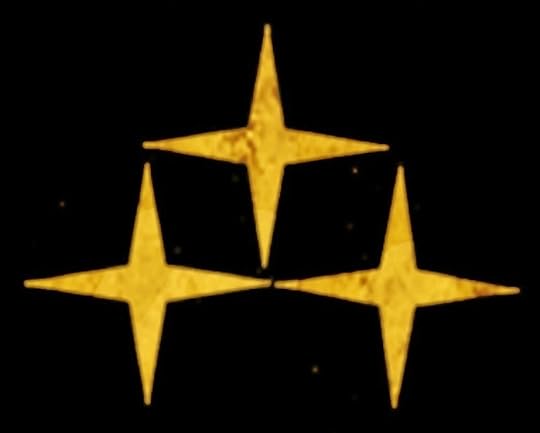
Darcy burned with the pain of knowing she’d failed. What happened when a prophecy didn’t come true? It must not have been much of a prophecy in the first place. And if they couldn’t trust in that, then they couldn’t trust in anything at all.
Five years ago, Darcy first received the prophecy of the Six, which stated she and her friends would save the land of Alitheia from a shadowy foe. For five years, she hasn’t known what the end will look like, but she certainly didn’t expected this.
Thrust back into Alitheia through unexpected means, Darcy winds up alone, scared, and without her recent memory. As she struggles to regain her lost memories and reunite with the ones she loves, she pieces together the prophecies and the oracles to find they all converge into one story - a story that tells her just how much she’ll have to give to save both worlds, and everyone she loves.
Pursued through Alitheia by forces desperate to kill them, Darcy and her friends take a journey fraught with danger that will lead them, inevitably, to the final confrontation with the Shadow. Armed with newfound knowledge of how the prophecy of the Six will play out, Darcy and the others must have faith in the face of mounting odds and adversity. Ultimately, the greatest courage of all belongs not to those who give something of themselves, but to those who let go of what they could never control.
Filled with stunning losses, heart-wrenching reunions, unexpected twists, and the power of love and sacrifice, the conclusion to The Gateway Chronicles will leave you breathless and begging for more from author K. B. Hoyle.

Darcy burned with the pain of knowing she’d failed. What happened when a prophecy didn’t come true? It must not have been much of a prophecy in the first place. And if they couldn’t trust in that, then they couldn’t trust in anything at all.
Five years ago, Darcy first received the prophecy of the Six, which stated she and her friends would save the land of Alitheia from a shadowy foe. For five years, she hasn’t known what the end will look like, but she certainly didn’t expected this.
Thrust back into Alitheia through unexpected means, Darcy winds up alone, scared, and without her recent memory. As she struggles to regain her lost memories and reunite with the ones she loves, she pieces together the prophecies and the oracles to find they all converge into one story - a story that tells her just how much she’ll have to give to save both worlds, and everyone she loves.
Pursued through Alitheia by forces desperate to kill them, Darcy and her friends take a journey fraught with danger that will lead them, inevitably, to the final confrontation with the Shadow. Armed with newfound knowledge of how the prophecy of the Six will play out, Darcy and the others must have faith in the face of mounting odds and adversity. Ultimately, the greatest courage of all belongs not to those who give something of themselves, but to those who let go of what they could never control.
Filled with stunning losses, heart-wrenching reunions, unexpected twists, and the power of love and sacrifice, the conclusion to The Gateway Chronicles will leave you breathless and begging for more from author K. B. Hoyle.
Published on April 29, 2014 14:27
April 15, 2014
Idiotic Adults, and Other Problems with YA Literature
I love Young Adult literature as much as the next person, probably more than most, given my position, but because I spend so much time reading YA, I've come to identify some recurring and troubling problems. The following are, of course, generalities, and the presence of any of these elements in a book doesn't mean that I won't/don't like the story, but they do tend to grate on me. These are also things I've tried to avoid in my own writing, so if you think I am myself an offender, definitely call me out!
1) Idiotic Adults. This one can be found all over. It's present in almost every YA book I read, and it never ceases to bother me. YA books these days tend to have a cast of teenage characters who are inexplicably wiser than any of the adults in the stories. Adults in YA literature are idiots, worthless, and/or wicked. They never have the answers, and they tend to contribute to the problems. Now, I understand that YA authors are trying to reach out to their primary fan base - teenagers - by giving them wish-fulfillment stories in which the teenagers save the day, and I don't have a problem with teenagers saving the day. But I do have a problem with the consistent lack of adult leadership. It sends a message to young people that they don't need adults in their lives, that when they enter adulthood themselves, they'll be relegated to the ranks of stupid and senile, and that wisdom is attained by the age of 17. Not only are all of these things false, but they are potentially damaging to a teenager's psyche and to the families of which they are a part. A wise mentor - at least one - was a staple of older literature for good reason, and I'd like to see it return to modern YA lit. Let's send a message to young people that, yes, they do have great potential, and yes, they can do great things, but they should also follow in the footsteps of wiser adults who have gone before them.
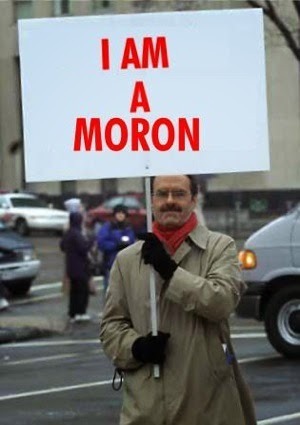
As a side note on this issue, I find it difficult to suspend disbelief when the teenagers save the world/have all the answers sans the expertise of any adults.
2) Age-inappropriate romance. Oh, the throes of teenage romance! Is there anything more dramatic or angst inducing in a young person's life? I fully understand the depth of feeling and emotion that comes with teenage romances, and I do believe that teenagers can fall legitimately in love, but it's rare for a teenage romance to be fully mature - especially after only a few days, which we're constantly asked to accept in YA lit. Teenagers do behave differently in relationships than adults do, and there are some things that come only with age and maturity, but I think many YA authors forget this when writing their romantic pairings. I recently finished a book in which the two main characters are only 15 years old, yet the way the author describes their thought processes toward each other (including sexuality) is more akin to how two 30-year-olds would think about each other. The mental processes of the characters did not match their ages, and that leads me to the next issue...
3) Age-inappropriate characterization. Kids should act and think primarily like kids. And like it or not, teenagers are still kids! When I read a book where the characters are 13, I want them to think and act like 13-year-olds. And this should be different from how 15-year-olds think and act, which should be different from how 17-year-olds act, etc... In fact, each year of a teenager's life bring great changes - intellectually, physically, spiritually, and in maturity - and to not differentiate between the ages is sloppy writing and disingenuous to teenagers themselves. I think a reader ought to be able to accurately guess the ages of the characters without them actually being stated, yet I'm constantly surprised when reading YA. "Wait... this character is only 14? I thought she was 18!" I think sometimes authors just want to publish a YA book, but they don't really want to put the time and effort in to figuring out how teenagers act, think, and speak. So what I find over and over again are stories that contain adults parading around as teenagers.
4) The most specialist girls in the world! I don't have a problem, per se, with the trend toward spunky female protagonists in YA lit, and I can't be too critical of it, as I also have female protagonists, but it is getting a little... overdone. Female YA protagonists are beginning to look like cookie cutters of each other, and it's almost without fail that the stories hinge on these girls being the most specialist girls in the world. But how long will readers buy into this repeating storyline? Spunky teenage girl discovers she's the key to solving all of society's ills while teaming up with tragic, brooding, attractive male counterpart. I tried to avoid this cliche by making Darcy reliant on a cast of characters (and wise, adult mentors!), rather than finding all the answers within herself.
All right, these are just a few of mine, but this blog post is getting long, so I'll leave it at that. Agree with me? Disagree? What are some trends of YA lit that bother you?
1) Idiotic Adults. This one can be found all over. It's present in almost every YA book I read, and it never ceases to bother me. YA books these days tend to have a cast of teenage characters who are inexplicably wiser than any of the adults in the stories. Adults in YA literature are idiots, worthless, and/or wicked. They never have the answers, and they tend to contribute to the problems. Now, I understand that YA authors are trying to reach out to their primary fan base - teenagers - by giving them wish-fulfillment stories in which the teenagers save the day, and I don't have a problem with teenagers saving the day. But I do have a problem with the consistent lack of adult leadership. It sends a message to young people that they don't need adults in their lives, that when they enter adulthood themselves, they'll be relegated to the ranks of stupid and senile, and that wisdom is attained by the age of 17. Not only are all of these things false, but they are potentially damaging to a teenager's psyche and to the families of which they are a part. A wise mentor - at least one - was a staple of older literature for good reason, and I'd like to see it return to modern YA lit. Let's send a message to young people that, yes, they do have great potential, and yes, they can do great things, but they should also follow in the footsteps of wiser adults who have gone before them.

As a side note on this issue, I find it difficult to suspend disbelief when the teenagers save the world/have all the answers sans the expertise of any adults.
2) Age-inappropriate romance. Oh, the throes of teenage romance! Is there anything more dramatic or angst inducing in a young person's life? I fully understand the depth of feeling and emotion that comes with teenage romances, and I do believe that teenagers can fall legitimately in love, but it's rare for a teenage romance to be fully mature - especially after only a few days, which we're constantly asked to accept in YA lit. Teenagers do behave differently in relationships than adults do, and there are some things that come only with age and maturity, but I think many YA authors forget this when writing their romantic pairings. I recently finished a book in which the two main characters are only 15 years old, yet the way the author describes their thought processes toward each other (including sexuality) is more akin to how two 30-year-olds would think about each other. The mental processes of the characters did not match their ages, and that leads me to the next issue...
3) Age-inappropriate characterization. Kids should act and think primarily like kids. And like it or not, teenagers are still kids! When I read a book where the characters are 13, I want them to think and act like 13-year-olds. And this should be different from how 15-year-olds think and act, which should be different from how 17-year-olds act, etc... In fact, each year of a teenager's life bring great changes - intellectually, physically, spiritually, and in maturity - and to not differentiate between the ages is sloppy writing and disingenuous to teenagers themselves. I think a reader ought to be able to accurately guess the ages of the characters without them actually being stated, yet I'm constantly surprised when reading YA. "Wait... this character is only 14? I thought she was 18!" I think sometimes authors just want to publish a YA book, but they don't really want to put the time and effort in to figuring out how teenagers act, think, and speak. So what I find over and over again are stories that contain adults parading around as teenagers.
4) The most specialist girls in the world! I don't have a problem, per se, with the trend toward spunky female protagonists in YA lit, and I can't be too critical of it, as I also have female protagonists, but it is getting a little... overdone. Female YA protagonists are beginning to look like cookie cutters of each other, and it's almost without fail that the stories hinge on these girls being the most specialist girls in the world. But how long will readers buy into this repeating storyline? Spunky teenage girl discovers she's the key to solving all of society's ills while teaming up with tragic, brooding, attractive male counterpart. I tried to avoid this cliche by making Darcy reliant on a cast of characters (and wise, adult mentors!), rather than finding all the answers within herself.
All right, these are just a few of mine, but this blog post is getting long, so I'll leave it at that. Agree with me? Disagree? What are some trends of YA lit that bother you?
Published on April 15, 2014 18:57
April 2, 2014
A Rested Brain
As I sit before my loyal Scribbus MacDoodle (my laptop, of course), I can't help but breathe a sigh of relief. I haven't blogged much this year - or, at all - but I have finished another manuscript and submitted it to my editing team, and I'm in that sweet spot of waiting for one of my two manuscripts to come back to me. The copy edit is currently underway for The Bone Whistle, and the manuscript evaluation is underway for Breeder. I don't know how long it will be on either of these, but it is a strange feeling to have no writing or editing hanging over my head. I haven't had a break like this since . . . I can't remember when, actually, but it's offering me a good opportunity to get caught up on some things I've been neglecting all these long months. Such as blogging. So this is just a basic update on a rested brain about a few of the things I have coming up.
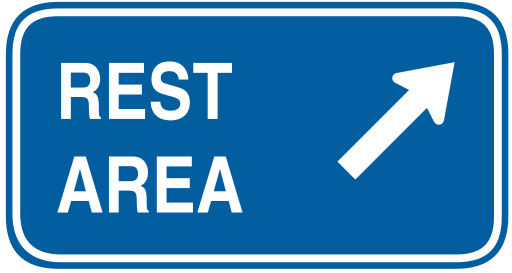
Tomorrow night I go to speak at a gathering of educators in a suburb about a half hour north of me. I'm looking forward to sharing my publishing journey with them and getting to know them and their visions for their students. Hopefully I can build some good relationships there that will endure and lead to some speaking engagements with some of their schools in the coming months.
At the end of the month, I travel to Georgia to visit a school during their spring literature day. I'll get to be in a few classrooms and interact with the students one on one - something I really enjoy doing. I started writing my first novel when I was eleven, so I really have a passion to encouraging that creative spirit from an early age.
In July, I'll be speaking as part of a writing workshop at my local library in Alabaster, AL. I haven't had the opportunity to do a lot of activities like this in my immediate community, so I'm really looking forward to it!
I just finished off a great month of partnership with the charitable organization called One Tough Kid (http://www.onetoughkid.org). Sales were high during the month of March, which is excellent, as I'm donating $1 of every book I sold last month to One Tough Kid. I will be continuing my relationship with them and looking forward to further opportunities to partner and help support their organization. A big THANK YOU to all those who purchased my books last month and helped support OTK.
From May to September, I will be working on writing the remaining two installments to my Breeder Cycle trilogy: Criminal and Clone. I would really like to have these two finished and ready for submission should my publishing house decide to move forward with publishing the entire trilogy.
In October, the final installment of The Gateway Chronicles, The Bones Whistle will be published, and I will also be giving birth to another baby - our fourth! So, big month there!
And last but not least, in December Breeder should be published, assuming my editors like what they are currently reading and give the green light to move ahead with that project. I'm confident with the story, though, in fact, I really love it! And early beta reader feedback has been very positive, so that's always a good sign.
Don't forget, you can always follow me on Facebook (https://www.facebook.com/pages/K-B-Hoyle/155377154576880) and/or Twitter (https://twitter.com/kbhoyle_author) for up-to-the-minute news and information! Or . . . at least up to the day. :)

Tomorrow night I go to speak at a gathering of educators in a suburb about a half hour north of me. I'm looking forward to sharing my publishing journey with them and getting to know them and their visions for their students. Hopefully I can build some good relationships there that will endure and lead to some speaking engagements with some of their schools in the coming months.
At the end of the month, I travel to Georgia to visit a school during their spring literature day. I'll get to be in a few classrooms and interact with the students one on one - something I really enjoy doing. I started writing my first novel when I was eleven, so I really have a passion to encouraging that creative spirit from an early age.
In July, I'll be speaking as part of a writing workshop at my local library in Alabaster, AL. I haven't had the opportunity to do a lot of activities like this in my immediate community, so I'm really looking forward to it!
I just finished off a great month of partnership with the charitable organization called One Tough Kid (http://www.onetoughkid.org). Sales were high during the month of March, which is excellent, as I'm donating $1 of every book I sold last month to One Tough Kid. I will be continuing my relationship with them and looking forward to further opportunities to partner and help support their organization. A big THANK YOU to all those who purchased my books last month and helped support OTK.
From May to September, I will be working on writing the remaining two installments to my Breeder Cycle trilogy: Criminal and Clone. I would really like to have these two finished and ready for submission should my publishing house decide to move forward with publishing the entire trilogy.
In October, the final installment of The Gateway Chronicles, The Bones Whistle will be published, and I will also be giving birth to another baby - our fourth! So, big month there!
And last but not least, in December Breeder should be published, assuming my editors like what they are currently reading and give the green light to move ahead with that project. I'm confident with the story, though, in fact, I really love it! And early beta reader feedback has been very positive, so that's always a good sign.
Don't forget, you can always follow me on Facebook (https://www.facebook.com/pages/K-B-Hoyle/155377154576880) and/or Twitter (https://twitter.com/kbhoyle_author) for up-to-the-minute news and information! Or . . . at least up to the day. :)
Published on April 02, 2014 15:03
January 1, 2014
And Now For Something Completely Different...
2013 wrapped with me finishing the first draft of the final book in The Gateway Chronicles: The Bone Whistle. While I am far from finished with working on TGC and all that goes along with it, finishing the first draft of book 6 is very much a closing of a door, a turning of a page, a . . . whatever metaphor you want to apply to it. I'm moving on! After seven years of devoting all my writing energies to one series, I am more than ready to expand my repertoire a bit, and the first project that will demand my attention is one I've been planning for about two years. Tonight I will submit my draft of The Bone Whistle to my excellent editing team (with crossed fingers and bated breath), tomorrow I will work on a couple short beta reading projects I have committed to, and probably the day after that, I will begin serious work on Breeder.

Dystopian fascinates me. It is a sort of fantasy because the author has to imagine a world that doesn't exist, but it is also a sort of science fiction because the author has to imagine a world that could exist in the future. And from there, the possibilities are almost endless! I think Dystopian provides an excellent venue for an author to foretell a lot about what he or she believes will go wrong with the world as a result of current societal/cultural/ideological ills, and as such, as a genre, it is almost always intentionally instructive and simultaneously controversial. This presents a lot of challenges to the serious writer of Dystopia. How to instruct without being overly didactic? How to handle controversy? How far ahead to look? How to convince people of a worldview they might not otherwise consider? How to do all this WHILE keeping in mind that the primary function of a work of fiction is to entertain?
I'm looking forward to these challenges, even as some of them scare me. Breeder will be the first in a trilogy of books that I'm simply calling the Breeder Cycle, and it will be totally different from TGC - different in setting, different in tone, perspective, and voice, different in almost every way. My very young readers, and parents of my very young readers, should be informed that I don't intend this book to be for them (UNLESS parental units preview it and find it appropriate for their child, of course). I'm classifying it as New Adult, which means I'm writing it for an audience of 16-25 year olds, but I anticipate it may be appropriate for mature readers as young as 13 - again, depending on parental approval. To give you some idea of how this is different, I wrote TGC for ages 13-17, with each book maturing some along the way. Breeder must be written for an older audience because the subject matter will be weighty, and some people will find it controversial. (I don't want to leave my younger readers completely in the lurch, though, and I have some plans to that effect. But until I know anything for sure, that's all I'll say!)
So, I'll be keeping you posted throughout 2014 as to the progress of The Bone Whistle and Breeder. As I'm writing Breeder, I'll be waiting on the editorial review on The Bone Whistle, which will be followed by the substantive edit. And basically I'll be back and forth between edits on the two books following manuscript submission of Breeder in March. I also have a few trips planned for the spring to visit schools and do educational talks, signings, etc., but my schedule is not full, so e-mail me if you or your school wants to host me! kbhoyle.author@gmail.com Cover design on both books is also well in swing, and come Spring, I'll toss you some teasers for TBW.
Overall, 2013 was a great year! I got to travel to Sydney, Australia and be a featured speaker at the Sydney Writer's Festival, I participated in two more festivals at which my books were the bestselling in their categories, I released book 5 in TGC, The Six and The Scroll became Amazon top 100 books, I had my first TV appearance, and I wrote The Bone Whistle. I'm hoping and praying for as much success, and more, in 2014. I'm so thankful to you all for making it happen!

Dystopian fascinates me. It is a sort of fantasy because the author has to imagine a world that doesn't exist, but it is also a sort of science fiction because the author has to imagine a world that could exist in the future. And from there, the possibilities are almost endless! I think Dystopian provides an excellent venue for an author to foretell a lot about what he or she believes will go wrong with the world as a result of current societal/cultural/ideological ills, and as such, as a genre, it is almost always intentionally instructive and simultaneously controversial. This presents a lot of challenges to the serious writer of Dystopia. How to instruct without being overly didactic? How to handle controversy? How far ahead to look? How to convince people of a worldview they might not otherwise consider? How to do all this WHILE keeping in mind that the primary function of a work of fiction is to entertain?
I'm looking forward to these challenges, even as some of them scare me. Breeder will be the first in a trilogy of books that I'm simply calling the Breeder Cycle, and it will be totally different from TGC - different in setting, different in tone, perspective, and voice, different in almost every way. My very young readers, and parents of my very young readers, should be informed that I don't intend this book to be for them (UNLESS parental units preview it and find it appropriate for their child, of course). I'm classifying it as New Adult, which means I'm writing it for an audience of 16-25 year olds, but I anticipate it may be appropriate for mature readers as young as 13 - again, depending on parental approval. To give you some idea of how this is different, I wrote TGC for ages 13-17, with each book maturing some along the way. Breeder must be written for an older audience because the subject matter will be weighty, and some people will find it controversial. (I don't want to leave my younger readers completely in the lurch, though, and I have some plans to that effect. But until I know anything for sure, that's all I'll say!)
So, I'll be keeping you posted throughout 2014 as to the progress of The Bone Whistle and Breeder. As I'm writing Breeder, I'll be waiting on the editorial review on The Bone Whistle, which will be followed by the substantive edit. And basically I'll be back and forth between edits on the two books following manuscript submission of Breeder in March. I also have a few trips planned for the spring to visit schools and do educational talks, signings, etc., but my schedule is not full, so e-mail me if you or your school wants to host me! kbhoyle.author@gmail.com Cover design on both books is also well in swing, and come Spring, I'll toss you some teasers for TBW.
Overall, 2013 was a great year! I got to travel to Sydney, Australia and be a featured speaker at the Sydney Writer's Festival, I participated in two more festivals at which my books were the bestselling in their categories, I released book 5 in TGC, The Six and The Scroll became Amazon top 100 books, I had my first TV appearance, and I wrote The Bone Whistle. I'm hoping and praying for as much success, and more, in 2014. I'm so thankful to you all for making it happen!
Published on January 01, 2014 14:20
November 29, 2013
"The End is Where We Begin"
You know, I don't often comment about books I don't like on here. I usually only comment on books that I LOVE and want to make sure y'all know influenced me, but I was reading through reviews for the third in a YA trilogy I was mildly interested in finishing - not madly in love with as many other people are - but interested in finishing . . . until the preponderance of the reviews came back negative. I won't name the book because I'm not interested in damaging the career of any fellow author, no matter how misguided she may have been with this book, but I mention this here because a) I think it's important for authors to pay attention to both good and bad reviews because we have a responsibility to our readers, and b) There was a comment made in one of the reviews that made me go, "uh huh! That's why." One reviewer said that this author has been quoted in interviews saying that she had "no idea" where the story was going when she first started writing the series. My creative writing students will chuckle at this, but if I've said it once, I've said it a thousand times - you DO NOT START WRITING A BOOK BEFORE YOU KNOW THE ENDING. This holds *especially* true for writing a series! If you are scrambling to make sense of everything you've already written at the end of the series, your readership can tell. At least, with this particular series, I could already tell from the beginning that she didn't have a plan, which is part of why I didn't get too emotionally invested in it in the first place.
So, here's what I promise you.

I have a plan. I have always had a plan. I planned out the basic premises of all six books before I started writing book 1, and I've known how the whole series will end before I started writing book 1. Have there been some changes to my plan along the way? Sure! Have I come up with new and different ideas as I go? Of course! Has the story evolved somewhat organically once the ball got rolling? You bet! But I have striven very hard to keep everything pointing toward the ending I planned out six years ago, and that has helped me to write a story that is coherent, logical, and enjoyable. You, the reader, can trust me. I take your feelings into consideration, and as long as I CAN work something in that I know you want, I WILL. Everything that you think "means something" probably in fact does, and there really is a "puzzle" for you to figure out. AND I have beta readers already lined up to read book 6 when I finish who will let me know if my plan has been executed to satisfaction and whether or not you, the reader, will feel fulfilled by it. I don't want to let you down, and I think any author who puts edginess or shock value above the needs of the readers has lost his/her way. I promise to give you an ending that has a eucatastrophe, an ending that makes sense, and an ending that has, really, existed all along.
One of my favorite bands has a recently-released album entitled, "The End is Where We Begin." Good advice for any author, especially an author with thousands of people riding on his/her books. At the end of the day, I don't want my readers to close book 6 and say, "What was the point?" And that is clearly what has happened to this author.
So, here's what I promise you.

I have a plan. I have always had a plan. I planned out the basic premises of all six books before I started writing book 1, and I've known how the whole series will end before I started writing book 1. Have there been some changes to my plan along the way? Sure! Have I come up with new and different ideas as I go? Of course! Has the story evolved somewhat organically once the ball got rolling? You bet! But I have striven very hard to keep everything pointing toward the ending I planned out six years ago, and that has helped me to write a story that is coherent, logical, and enjoyable. You, the reader, can trust me. I take your feelings into consideration, and as long as I CAN work something in that I know you want, I WILL. Everything that you think "means something" probably in fact does, and there really is a "puzzle" for you to figure out. AND I have beta readers already lined up to read book 6 when I finish who will let me know if my plan has been executed to satisfaction and whether or not you, the reader, will feel fulfilled by it. I don't want to let you down, and I think any author who puts edginess or shock value above the needs of the readers has lost his/her way. I promise to give you an ending that has a eucatastrophe, an ending that makes sense, and an ending that has, really, existed all along.
One of my favorite bands has a recently-released album entitled, "The End is Where We Begin." Good advice for any author, especially an author with thousands of people riding on his/her books. At the end of the day, I don't want my readers to close book 6 and say, "What was the point?" And that is clearly what has happened to this author.
Published on November 29, 2013 15:17
November 2, 2013
Letter to My Readers
Dear Readers,
A long time ago (in a galaxy far, far away . . . sorry, I couldn't resist), I said that I would just like to hit some bestselling list somewhere, somehow. I will admit that I really didn't think this would happen, at least not any time soon, so imagine my surprise when The Scroll, and then The Six, hit Amazon top 100 lists and stayed there . . . for a week! I am truly overwhelmed and humbled by the outpouring of support for my books, especially as of late, and I wanted to write and let you all know how thankful I am.
I've never been one of those authors who puts the "art" over all else. I am well aware that being an author is to be in the entertainment industry, and if I am not entertaining in the entertainment industry, then I am failing at my job. This has never been about being "true to myself," nor has it been some abstract thing where I just feel compelled to "create." Yes, I do want to be true to the calling that is on my life, and yes, I do want to create (or rather, subcreate, as I see it, but that's a discussion for a different day), but I feel very strongly that telling a good story that people get as invested in as some of you have gotten invested in mine is as much a service as anything else. I feel it is a high calling to be a storyteller, and that calling comes with a responsibility to not only tell a good story well, but to uplift the reader, and to meet their expectations for my work - expectations that I, as the storyteller, have set up. In a way, there is an informal contract that exists between reader and author. You have shown your dedication to my stories by buying them, reading them, discussing them, and (in some cases) leaving reviews on Amazon and elsewhere. I promise to do my best to not disappoint any expectations you may have for how the story should end. At the very least, even if you don't like how I end the stories, hopefully you will all find it to be at least a fulfilling ending. I take this very seriously - I always have!
But, at the risk of getting too much further offtrack from what I set out to do, I really just wanted to say THANK YOU!

I can hardly believe I can now call myself a bestselling author, and that sort of thing has ultimately very little to do with me, and very much to do with you. There would be no bestsellers without readers like you who support authors like me. Many people have written fabulous novels that have disappeared into obscurity for lack of a good readership base, and I count myself blessed to not be in that situation. I say onwards and upwards, and hopefully, with your support (and the tireless efforts of my unofficial social media army), we will all be rewarded with more and greater things happening for The Gateway Chronicles.
Yours very humbly,
K. B. Hoyle
A long time ago (in a galaxy far, far away . . . sorry, I couldn't resist), I said that I would just like to hit some bestselling list somewhere, somehow. I will admit that I really didn't think this would happen, at least not any time soon, so imagine my surprise when The Scroll, and then The Six, hit Amazon top 100 lists and stayed there . . . for a week! I am truly overwhelmed and humbled by the outpouring of support for my books, especially as of late, and I wanted to write and let you all know how thankful I am.
I've never been one of those authors who puts the "art" over all else. I am well aware that being an author is to be in the entertainment industry, and if I am not entertaining in the entertainment industry, then I am failing at my job. This has never been about being "true to myself," nor has it been some abstract thing where I just feel compelled to "create." Yes, I do want to be true to the calling that is on my life, and yes, I do want to create (or rather, subcreate, as I see it, but that's a discussion for a different day), but I feel very strongly that telling a good story that people get as invested in as some of you have gotten invested in mine is as much a service as anything else. I feel it is a high calling to be a storyteller, and that calling comes with a responsibility to not only tell a good story well, but to uplift the reader, and to meet their expectations for my work - expectations that I, as the storyteller, have set up. In a way, there is an informal contract that exists between reader and author. You have shown your dedication to my stories by buying them, reading them, discussing them, and (in some cases) leaving reviews on Amazon and elsewhere. I promise to do my best to not disappoint any expectations you may have for how the story should end. At the very least, even if you don't like how I end the stories, hopefully you will all find it to be at least a fulfilling ending. I take this very seriously - I always have!
But, at the risk of getting too much further offtrack from what I set out to do, I really just wanted to say THANK YOU!

I can hardly believe I can now call myself a bestselling author, and that sort of thing has ultimately very little to do with me, and very much to do with you. There would be no bestsellers without readers like you who support authors like me. Many people have written fabulous novels that have disappeared into obscurity for lack of a good readership base, and I count myself blessed to not be in that situation. I say onwards and upwards, and hopefully, with your support (and the tireless efforts of my unofficial social media army), we will all be rewarded with more and greater things happening for The Gateway Chronicles.
Yours very humbly,
K. B. Hoyle
Published on November 02, 2013 15:03
October 9, 2013
Blog Tour and Sneak Peek!
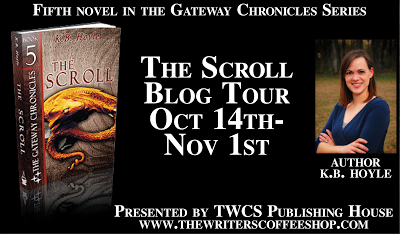
It's almost that time again - time for a Blog Tour! In honor of the upcoming release of book 5 of The Gateway Chronicles, The Scroll, my publishing house is hosting a Blog Tour that will begin on Monday, October 14th. Featured will be reviews, guest posts, and more! I hope you tune in for all the action (metaphorically speaking, of course. Writers tend to not actually be that active...) :) The schedule for the tour is as follows:
10/14- http://www.firstpagetothelast.com/10/15- www.girl-who-reads.com - review
10/16- peddlerofdreams.wordpress.com- review and guest post
10/17-http://yogateachertrainingjourney.blogspot.com-excerpt
10/18- http://Strohschein.wordpress.com
10/19- http://paperbookprincess.com/- review and guest post10/20- cafeartspace.blogspot.com10/21- www.girl-who-reads.com - guest post
10/22- http://sunshineandmountains.wordpress.com- review and guest post
10/24- http://fveslibrary.blogspot.com
10/31- http://arraabella.blogspot.com/- soundtrack
11/1- http://arraabella.blogspot.com/
While the tour is going on, I will also post daily links on my Facebook page here: https://www.facebook.com/pages/K-B-Hoyle/155377154576880
Also, don't forget that I have a new website, and there is a giveaway running on it where you can win an entire E-Book set of books 1-5 of The Gateway Chronicles! Visit and enter now: www.kbhoyle.com
And now, since we are a week (a WEEK!) away from the release of The Scroll, I decided to give you the entire prologue as a sneak peek. Enjoy! I hope it builds your excitement to get your hands on the book next week.

The Scroll
“What can you ever really know of other people’s souls—of their temptations, their opportunities, their struggles? One soul in the whole creation you do know: and it is the only one whose fate is placed in your hands.” C. S. Lewis
PrologueThe Boy and the Fire
Six Years Ago
Colin couldn’t breathe. His father’s hands were iron gloves around his throat, threatening to do it, to finally kill him. Black dots danced before his eyes, and the side of the building slid out of focus as laughter and a babble of conversation joined with mangled strains of Für Elise not ten feet away. His mind was screaming. Come outside! Somebody open the door. But they didn’t. Nobody ever came to his aid. They all hated him, like his father did. His feet twitched, his toes just brushing the ferns in the underbrush, until his dad released him to fall in a crumpled heap on the ground. Colin dragged a ragged breath into his lungs and rolled over, keeping his father always in his sight. He knew what was coming next—the explanation, the ranting and raving, and then more pain. “You embarrassed me,” Lawrence Mackaby said as he raked his hands through his golden-blond hair. “Embarrassed me! How dare you make me look bad in front of a potential client?” He fumbled his cigarette lighter from his pocket and Colin flinched, cowering among the leaves. So it was to be burns again. He still bore the scars on his chest from the last time. His father lit a cigarette and took a long drag, his hands shaking with rage. Another burst of laughter came from inside the rec hall, and Colin imagined the potential client, the wealthy parent of some camper, waiting on his dad’s return and assuming Colin’s dad had taken him outside merely for a lecture on polite behavior. “If I lose his business because of you, you’re going to wish you had never been born,” Mr. Mackaby said, his voice eerily calm. “Stand up.” Colin struggled to obey, but his clothes were caught in the underbrush, holding him down as though conspiring against his father’s command. Mr. Mackaby grabbed Colin by the shoulder and wrenched him up so violently Colin stumbled and almost fell again. “Stand up straight and face me like a man. Stop crying like a girl!” Was he crying? He hadn’t realized. His father pointed at his chest with the cigarette. “Lift your shirt.” Colin met his father’s eyes with a dull stare. Just hit me, he thought. Hit me and be done with it. The blows he could take. Sometimes he even savored the pain, imagining himself absorbing it and storing it away for some future day when he’d get his revenge. But the burns grew worse even after the fire was gone. They sizzled and festered, and they smelled of cooked flesh. Colin fingered the hem of his shirt, not taking his eyes off his father’s face. If he did it slowly enough, maybe his father would grow impatient and hit him instead. Mr. Mackaby lunged forward and ripped Colin’s shirt up and over his head so that he was blinded by fabric and his arms were pinned above him. The searing pain of the hot ash against his skin took his breath away, and then he cried out and kicked with all his might. He felt his foot connect and heard his father double over with a grunt. Colin fell into the undergrowth, flailing against his shirt as he tried to regain his sight. He heard his father curse, and the smell of smoke intensified. He yanked his shirt back down over his chest in time to see a pile of dry pine needles go up in a blaze of fire. His father cursed again and kicked at the pile, sending the flames skittering toward the rec hall. Colin coughed as the smoke invaded his lungs. The small fire was already blackening the siding of the building. It was his father’s cigarette, his father’s fault, but that wouldn’t matter. Like a snake, he’d slither out of it, and Colin would be blamed. So he ran. His father called his name, shouted for him to come back, but Colin kept running. Going to jail for arson, or wherever they sent eleven-year-old criminals, would be worse than any punishment his father could concoct for him. He crashed through the underbrush, not paying attention to where he was going. The air around him cleared of smoke just as screams echoed from the rec hall. But they’d get out. There were plenty of exits and tall windows. None of them really knew what it was to be trapped. Before long, he glimpsed the silvery sheen of the lake through the trees and recognized where he was—the Cedar Point Trail, far removed from the chaos behind him. He slowed to a walk and caught up against a tree. His chest burned from smoke inhalation and exertion, and the actual burn on his skin felt as though it was still on fire. He bent double and held on to the tree for support as he took deep breaths. The deeper he breathed, the more his eyes welled with tears and, before he knew it, he was sobbing and clutching at the tree bark as though his fingernails were claws. I hate you, I hate you, I hate you, he thought, wishing his father could feel the power of his oath and burn under it as Colin had burned under the cigarette. “I’ll make you sorry someday,” Colin said, spitting the words like acid. “I swear it, someday I’ll be powerful, and I’ll make you pay!” A chill of cold air washed down his back, and he straightened and stilled his sobs and his breathing. The forest had gone silent, and fear invaded his mind where rage had been a moment before. Colin squinted at what looked like a shadow, hovering in the woods, not belonging to any of the trees around it. It was indistinct and shapeless, but it was there. “Hello?” Another burst of cold air swept around his neck, and with it came words so quiet they might not have been words at all, but thoughts invading his own. You asked for power? Colin shivered and took a step toward the shadow. “Are you talking to me?” That chill again. The voice. Power is my specialty. Who has hurt you? I can help you to make it right. “My—my father.” Do you desire to hurt him back? Colin squared his shoulders. “Yes.” It will take time, and if I help you, you must promise also to help me. “I won’t have to do anything . . . illegal, will I?” Colin suppressed the voice in the back of his head that said revenge on his father would certainly be illegal. The shadow began to fade. “Wait! I’ll help you.” Promise. “I promise.” The shadow darkened and then came near him. I’ve been waiting a long time for you. I’m glad we’re going to be friends. “Sure.” Colin’s teeth chattered as the shadow’s approach brought a renewed burst of cold. “What are you? Do you have a name?” My name is Tselloch. Let that be enough for now.
Published on October 09, 2013 19:32
September 30, 2013
Make Time to Read!
I thought of this post as a piggyback off the post I did a little while back called, "Make Time to Write!" I can't claim full credit for the idea, as a fellow author had recently posted in a discussion thread what is perhaps a little-known fact: that once we - authors - really get enmeshed in the business of being an author, we find it very difficult to actually read what our fellow authors are writing anymore! I read her comment and sat back and chuckled, because it is a very true statement. I know I'm speaking for many an author out there, but I think it's fair to say that authors love to read. Of course we do! Why else would we be writing stories of our own? But the tasks that surround first taking a story idea from conception to completion, then revising and producing it, followed by selling and promoting it, make for very little time to do other than those things. As I touched on in my previous post, it can be difficult enough to find the time to do that very quintessential thing which is writing. Sitting down to engross ourselves in any sort of leisure reading, therefor, tends to go out the window in a pinch.

But this is something that must not happen. If you consider yourself a writer of any sort, you must always make time to read!
Reading is one of the most important ways we hone our craft. As a teacher, I can always pick out my readers in my classes as the readers will almost inevitably be better writers. I have found over the years that people who don't read don't know how to craft engaging sentences, they don't know how to bend words to their needs, they don't understand, and therefore cannot utilize, the intricate subtleties of language. Writing is in large part imitative, and as writers, we first seek to emulate other writers we admire. And there is nothing wrong with that, in fact, it ought to be encouraged! I have never ascribed to the theory that everything we need to create a masterful work already exists within us. Rather, I believe writers are all born with an innate talent and predisposition for writing, but that writers must look outside themselves to learn the craft and hone it. Much like in physical disciplines such as martial arts, writers must also learn from a master, and it will only be after a great deal of "wax on, wax off" that a unique, creative voice will emerge. Once you know the craft, then you can really have fun with it! My creative writing students often don't like to hear this, but with the exception of a few creative geniuses, it will always hold true that most of your early writing will be little more than practice and imitation.
This is why writers must always read. Not only is it enjoyable and relaxing, but it helps with the ongoing task of learning how, and how not, to write. And if your time for leisure reading, like mine, is short, just be exceedingly choosy about your choice of reading. I've said it before, but I mainly only read books in the same genre in which I write - to see what's out there in the market, to see what "the kids" are reading, and to see what I find to be effective and ineffective writing (and storytelling, but that is often a different thing entirely!). So remember, "wax on, wax off!" Make time to read.

But this is something that must not happen. If you consider yourself a writer of any sort, you must always make time to read!
Reading is one of the most important ways we hone our craft. As a teacher, I can always pick out my readers in my classes as the readers will almost inevitably be better writers. I have found over the years that people who don't read don't know how to craft engaging sentences, they don't know how to bend words to their needs, they don't understand, and therefore cannot utilize, the intricate subtleties of language. Writing is in large part imitative, and as writers, we first seek to emulate other writers we admire. And there is nothing wrong with that, in fact, it ought to be encouraged! I have never ascribed to the theory that everything we need to create a masterful work already exists within us. Rather, I believe writers are all born with an innate talent and predisposition for writing, but that writers must look outside themselves to learn the craft and hone it. Much like in physical disciplines such as martial arts, writers must also learn from a master, and it will only be after a great deal of "wax on, wax off" that a unique, creative voice will emerge. Once you know the craft, then you can really have fun with it! My creative writing students often don't like to hear this, but with the exception of a few creative geniuses, it will always hold true that most of your early writing will be little more than practice and imitation.
This is why writers must always read. Not only is it enjoyable and relaxing, but it helps with the ongoing task of learning how, and how not, to write. And if your time for leisure reading, like mine, is short, just be exceedingly choosy about your choice of reading. I've said it before, but I mainly only read books in the same genre in which I write - to see what's out there in the market, to see what "the kids" are reading, and to see what I find to be effective and ineffective writing (and storytelling, but that is often a different thing entirely!). So remember, "wax on, wax off!" Make time to read.
Published on September 30, 2013 22:17
September 19, 2013
Instagram/Vine Video Challenge!
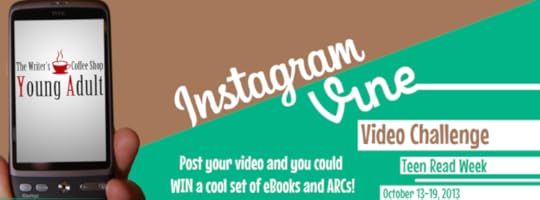
Teen Read Week is coming up – Oct. 13-19, 2013TWCS is excited to be part of the fun with a VINE/INSTAGRAM Video Challenge!
 How does it work? Simple. 1. Between September 12th and October 17th,
How does it work? Simple. 1. Between September 12th and October 17th,Make a VINE or INSTAGRAM video featuring a TWCS YA Book
2. Post it on the TWCS Young Adult Facebook Wall
3. Use the hashtag #YATWCSVINE There will be a PUBLIC VOTE to choose the BEST VINE October 17-19, 2013.In addition, a RANDOM WINNER will be chosen from all participants.
 What do you win? THIS cool prize package of eBooks and ARCs!
What do you win? THIS cool prize package of eBooks and ARCs!
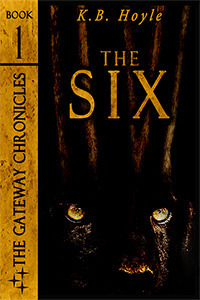

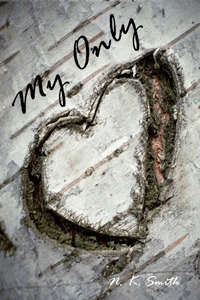
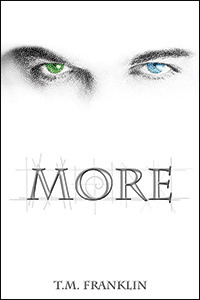
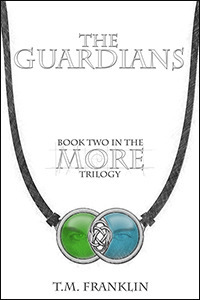
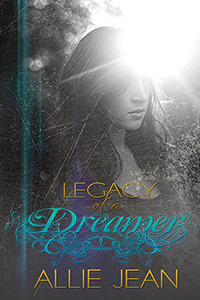
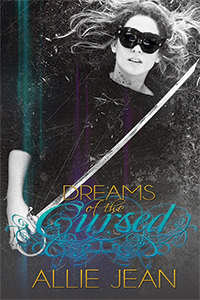
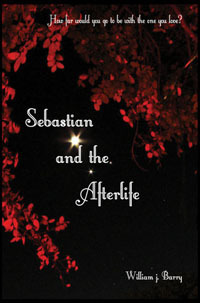
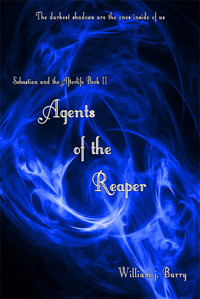
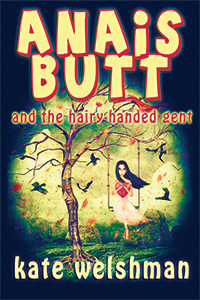
 So what do I VINE? Just show us something cool about a TWCS YA Book! We are asking our readers to come up with a VINE or Instagram Video of you or someone you know: •Reading a special part of the book•Acting out a scene of the book•Giving a review of the book•A funny reason why people should buy the book Be creative! Draw a comic strip! Have your dog read the book! Read the book to your dog!Use interpretive dance! Whatever!We want to see what you can do with that 7 seconds!
So what do I VINE? Just show us something cool about a TWCS YA Book! We are asking our readers to come up with a VINE or Instagram Video of you or someone you know: •Reading a special part of the book•Acting out a scene of the book•Giving a review of the book•A funny reason why people should buy the book Be creative! Draw a comic strip! Have your dog read the book! Read the book to your dog!Use interpretive dance! Whatever!We want to see what you can do with that 7 seconds!  Please base the VINE on one of following books. All are available in eBook or print on all major outlets.(Click on a cover for more information)
Please base the VINE on one of following books. All are available in eBook or print on all major outlets.(Click on a cover for more information)




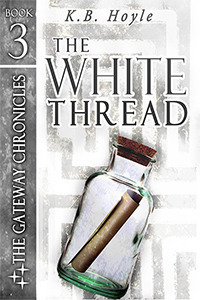
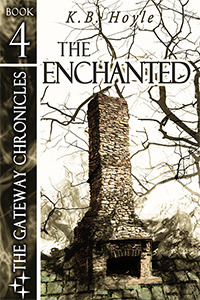


 Don't forget to post your VINE or INSTAGRAM Videos on
THE TWCS YOUNG ADULT FACEBOOK WALL
with the hashtag #YATWCSVINE (Click the link if you want to see an example) Winners for both BEST VINE and the random drawing will be announced on Oct. 19th Good luck, have fun, and happy Vining!! All videos must be rated for all audiences. All videos are subject to removal by TWCS Staff. Any video with the following will be removed immediately: swearing or vulgar language, nudity, sexual content, drug use, derogatory language, or racist remarks. The final decision on removal is solely the responsibility of TWCS.
Don't forget to post your VINE or INSTAGRAM Videos on
THE TWCS YOUNG ADULT FACEBOOK WALL
with the hashtag #YATWCSVINE (Click the link if you want to see an example) Winners for both BEST VINE and the random drawing will be announced on Oct. 19th Good luck, have fun, and happy Vining!! All videos must be rated for all audiences. All videos are subject to removal by TWCS Staff. Any video with the following will be removed immediately: swearing or vulgar language, nudity, sexual content, drug use, derogatory language, or racist remarks. The final decision on removal is solely the responsibility of TWCS.
Published on September 19, 2013 13:44



